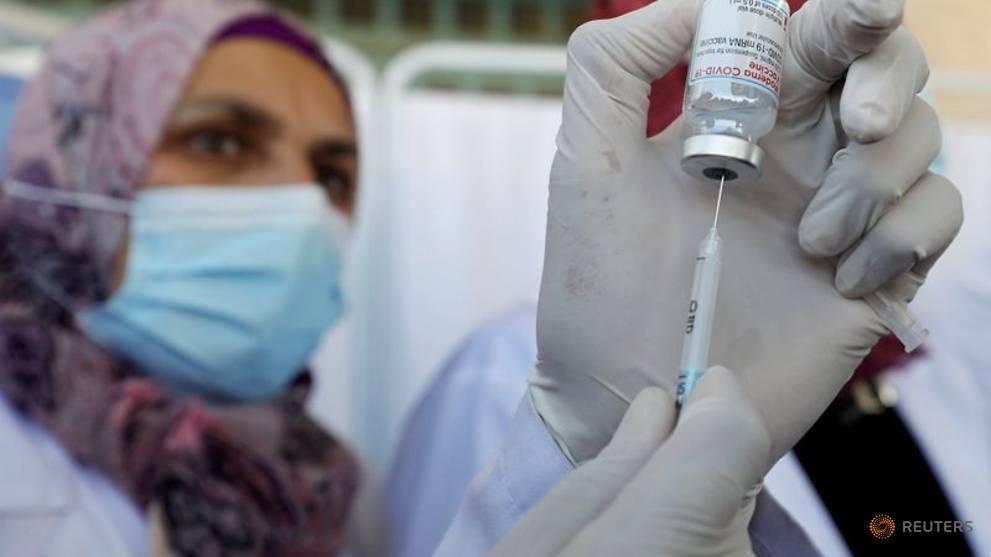
WASHINGTON: The International Monetary Fund on Friday (May 21) unveiled a US$50 billion proposal to end the COVID-19 pandemic by vaccinating at least 40 per cent of the population in all countries by the end of 2021 and at least 60 per cent by the first half of 2022.
Doing so, IMF officials say, would inject the equivalent of US$9 trillion into the global economy by 2025 due to a faster resumption of economic activity, with rich countries potentially benefiting the most.
The crisis has killed more than 3.5 million people across the world, and projections point to highly unequal health prospects well into 2022, which poses "severe risks for the world", the IMF said.
IMF Managing Director Kristalina Georgieva told a health summit hosted by the European Commission and Group of 20 major economies that it made sense for rich economies to boost donations to ensure a faster end to the pandemic.
"Advanced economies - asked to contribute most to this effort - would likely see the highest return on public investment in modern history, capturing 40 per cent of the GDP gains and roughly US$1 trillion in additional tax revenues," she said in her prepared remarks.
READ: Australia urges over-50s to get jabbed as COVID-19 vaccine hesitancy grows
READ: Australia seeks domestic capability to produce mRNA vaccines
The proposal, drafted by IMF chief economist Gita Gopinath and staff economist Ruchir Agarwal, builds on efforts already under way by the Access to COVID-19 Tools (ACT) Accelerator, United Nations, World Health Organization and other groups.
Implementing the plan would cost some US$50 billion, with US$35 billion to be paid for by grants from rich countries, private and multilateral donors, and the remaining US$15 billion to be funded by national governments using low- or no-interest financing available from multilateral development banks.
G20 countries had already recognized the need for some US$22 billion in grants to tackle the crisis, leaving some US$13 billion in additional grants needed to reach the US$50 billion, the IMF authors said.
The plan calls for upfront financing, vaccine donations and moves to ensure free cross-border flows of raw materials and finished vaccines, as well as some US$8 billion in investments to diversify and increase vaccine production capacity worldwide.
The IMF projected about 1 billion doses could be donated this year even if countries prioritised their own populations, and 1 billion additional doses should be produced by early 2022 to handle downside risks, such as new variants that require booster shots.
READ: Vaccines effective against COVID-19 variants but overseas travel still not safe: WHO
READ: UK increasingly confident that COVID-19 vaccines work against variant from India
While the vaccine supply was still limited, it called for US$30 billion in spending on widespread testing, sufficient therapeutics and preparations for vaccine deployment, as well as US$2 billion to evaluate and implement dose-stretching strategies.
Without urgent actions, many emerging and developing countries might have to wait until the end of 2022 or later to bring the pandemic under control, they said.
BOOKMARK THIS: Our comprehensive coverage of the COVID-19 pandemic and its developments
Download our app or subscribe to our Telegram channel for the latest updates on the coronavirus outbreak: https://cna.asia/telegram
https://news.google.com/__i/rss/rd/articles/CBMib2h0dHBzOi8vd3d3LmNoYW5uZWxuZXdzYXNpYS5jb20vbmV3cy93b3JsZC9pbWYtdW52ZWlscy11cy01MC1iaWxsaW9uLXByb3Bvc2FsLXRvLWVuZC1jb3ZpZC0xOS1wYW5kZW1pYy0xNDg1ODE0NtIBAA?oc=5
2021-05-21 13:16:58Z
52781609793776
Tidak ada komentar:
Posting Komentar